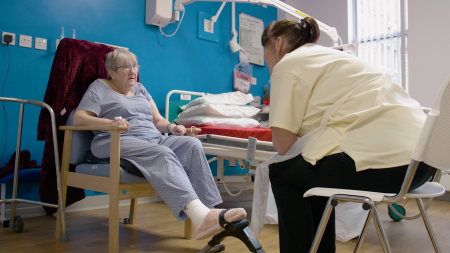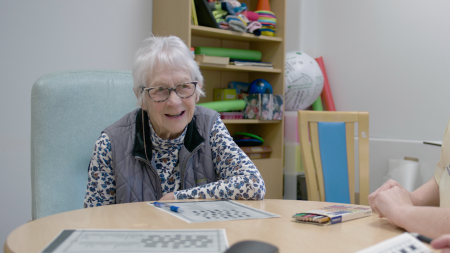Publish date: 20 November 2024
Wider roll-out of scheme to keep patients active and engaged in hospital

An initiative which helps hospital inpatients stay active and engaged is being expanded into more wards so that more people can benefit.
The active ward project was initially trialled on one ward at North Tyneside General Hospital, but its positive impact means that it is now running on five, with continued expansion across all of Northumbria Healthcare’s hospitals the ultimate goal.
The idea is simple; patients are encouraged to stay active while in hospital through a range of activities, such as using pedal exercisers, chair dancing, bowling and balloon games.
Staff also support patients to take part in activities that keep their mind active, such as crosswords, drawing, painting, bingo and quizzes.

“It is very good for other patients to keep them out of their beds and on their legs. Even a little walk up the corridor, some people don’t have that experience, but they should do, and it will help.
“Any hospital should think hard about activity. I’ve always been active, all my life, but being in hospital is the most inactive I’ve ever been.”
The scheme is just one of the success stories to come out of Northumbria Healthcare NHS Foundation Trust’s involvement in the Active Hospitals pilot.
The trust was one of just four organisations in the country to be part of this programme, which aimed to improve healthcare professionals’ awareness of the importance of physical activity while boosting their confidence and skills to promote it to patients.
The trust established a number of key pilot ‘pathways’, which all involved staff being trained to have more conversations with patients about being active to benefit their physical, mental and social wellbeing. One of these pathways was the active ward.
The Active Hospitals pilot ended in late 2022, but the trust made a commitment to continue the good work developed during the pilot. On the active ward, the experience showed more patients being up, dressed and ready to engage in therapy during their stay and it appeared to have supported earlier discharge in some cases.
Feedback from patients on the active wards is being closely monitored, and the results up to the end of 2023-24 show how more and more patients feel that the activity and exercises are benefitting them, and they are feeling less lonely and bored. The number of patients who say that the activities are too difficult and painful is decreasing in the main too.
Staff experience is also being monitored and the results have shown how engagement with the project has grown in recent months. Ward staff are also reporting that their involvement in encouraging patients to move more has resulted in greater job satisfaction.
Katy McKinney, a physiotherapy manager who looks after the active wards, said: “There is so much evidence to support the benefits of moving more and keeping mentally active, particularly in hospital. Therefore, it is such a simple idea to empower staff to support patients to do just that, but it is one that requires buy-in and hard work from staff.
“The pilot on Ward 24 showed just how valuable the active ward concept could be, and the staff and patient feedback from the latest wards to take part supports this as well.
“I would like to thank all those involved for making this a success so far, as we now look to embed this good practice across our hospitals for the benefit of our patients.”
Notes to editors
A report covering the original Active Hospitals pilot revealed that hundreds of staff, covering roles across the hospital workforce, had physical activity training to give them confidence to support patients to move more and stay active.
There were also a significant number of positive outcomes across key themes – workforce, infrastructure, culture, promotional activity and community outreach. You can read more here.
Active Hospitals was funded by Office for Health Improvement and Disparities, Sport England and the National Lottery, and led by the NHS Transformation Unit.
Media contact
Ben O’Connell, external communications manager, Northumbria Healthcare
Benjamin.O'Connell@northumbria-healthcare.nhs.uk or
